
KAUST plant scientists have revealed the role that the regulatory protein OXI1 plays in anti-pathogen immunity in plants. In this image, the plant specimens overexpressed OXI1, which manifests in the brown coloring when stained with a special dye.
© 2022 Rawat et al. New Phytologist © 2022 New Phytologist Foundation.
A master regulator of plant immunity
Stress-response protein promotes the accumulation of metabolites that help anti-pathogen defenses.
The demonstration that a regulatory protein linked to stress responses in plants also serves as a master switch for anti-pathogen immunity could help breeders develop more pest-resistant and climate-resilient crops.
The KAUST-led discovery suggests that, rather than focusing on individual immune signals involved in plant defenses, agricultural scientists looking to implement sustainable crop protection strategies could simply focus their efforts on this one all-important protein.
“The identification of OXI1 as a single molecular switch of immunity offers a number of big advantages in molecular breeding,” says study lead Heribert Hirt, a professor of plant science at KAUST.

Beneficial bacteria help wheat stand the heat
Coating crop seeds with bacteria found on a desert shrub boosts yields in hot fields.
Bacteria plucked from a desert plant could help crops survive heatwaves and protect the future of food
Global warming has increased the number of severe heatwaves that wreak havoc on agriculture, reduce crop yields and threaten food supplies. However, not all plants perish in extreme heat. Some have natural heat tolerance, while others acquire heat tolerance after previous exposure to higher temperatures than normal, similar to how vaccines trigger the immune system with a tiny dose of virus.
But breeding heat tolerant crops is laborious and expensive, and slightly warming entire fields is even trickier.
Healthy soils for healthy plants for healthy humans
To feed the world, #food production has to be increased by about 50 percent by the year 2050. #KAUST #PhD student Hanin Alzubaidy and #Research Scientist Maged Saad are working with Professor Heribert Hirt to increase salt tolerance and #crop yields – #agriculture pic.twitter.com/eeGXrCvU9L
— KAUST (@KAUST_News) February 26, 2018
To feed the world, #food production has to be increased by about 50 percent by the year 2050.

Healthy soils for healthy plants for healthy humans
How beneficial microbes in the soil, food and gut are interconnected and how agriculture can contribute to human health
The human gut microbiome is a complex system of gazillions of bacteria, fungi, viruses, protists and archaea that has an enormous effect on our metabolism, health and well‐being. The same holds true for the plant rhizosphere, the crucial parts below ground: roots are immersed in a soil microbiome that provides plants with important nutrients, protects them from disease and pathogens and helps plants to adapt to environmental changes . And, similar to faecal transplants in humans, soil transplants can have a drastic effect on plant health and growth.
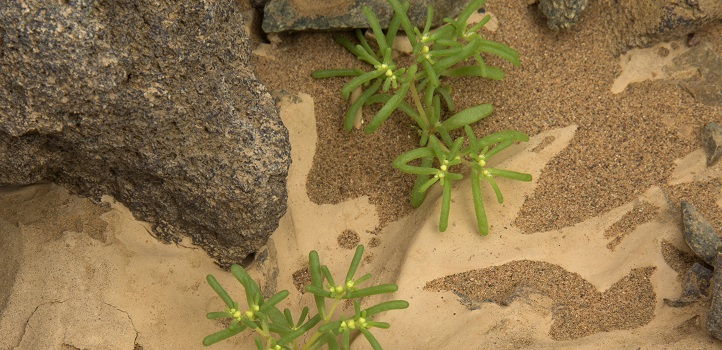
Mining bacteria from the desert
Desert bacteria protect food crops from salt toxicity
Bacteria isolated from the Saudi desert have demonstrated plant-growth-promoting properties that could make them useful as biofertilizers.
“The vast majority of deserts, especially in Saudi Arabia, have never been explored for agricultural potential,” says doctoral student, Abdul Aziz Eida, of KAUST’s Desert Agriculture Initiative. “Many people think deserts are sterile and inhospitable to any form of life. But there are many plants able to grow and survive in the harsh conditions found there. We believe that one of the key factors enabling plants to survive in such environments is their association with microbes in the soil.”
Mining bacteria from the desert
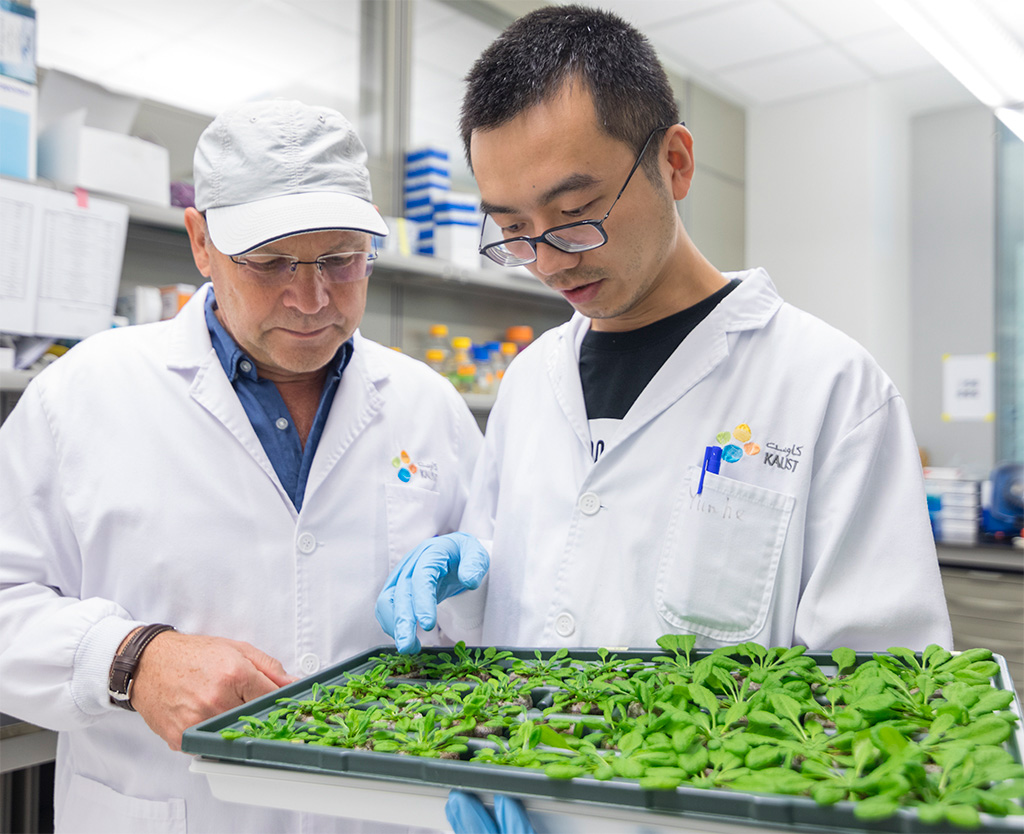
Regulator of plant immunity tagged
Discovery of signaling intermediary could lead to more pest-resistant crops.
A new actor in the immune system of plants has been identified. KAUST scientists have identified the protein MAP4K4 is needed to mount proper defenses against environmental pathogens.
The discovery helps explain the tight control of immune signaling in plants and reveals targets in a molecular pathway that could be manipulated by crop breeders. “Our findings are directly applicable to make plants more resistant to pathogens,” says study author, Heribert Hirt, professor of plant science at KAUST’s Center for Desert Agriculture….
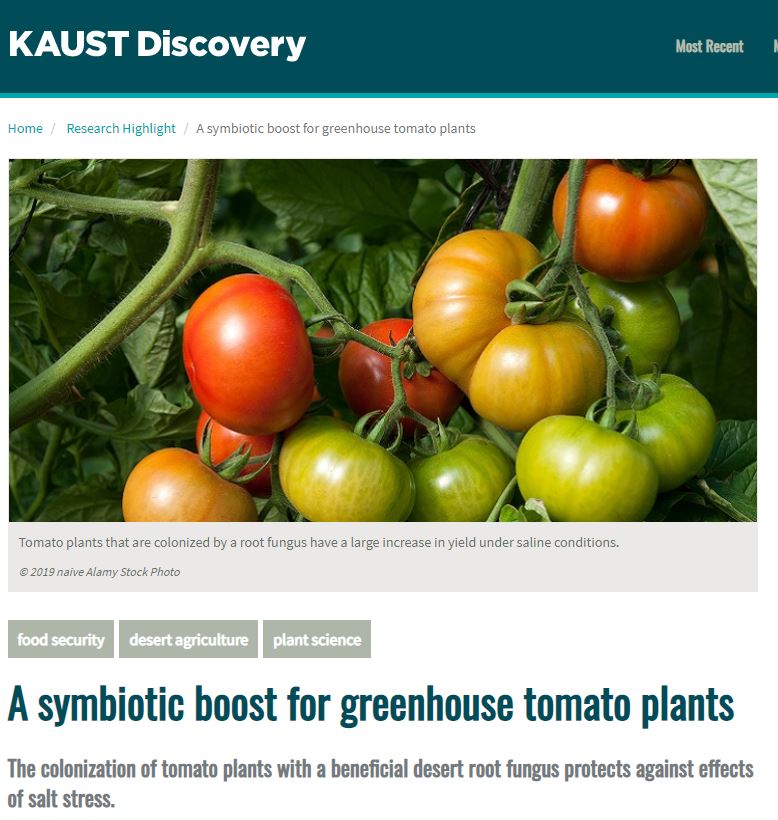
A symbiotic boost for greenhouse tomato plants
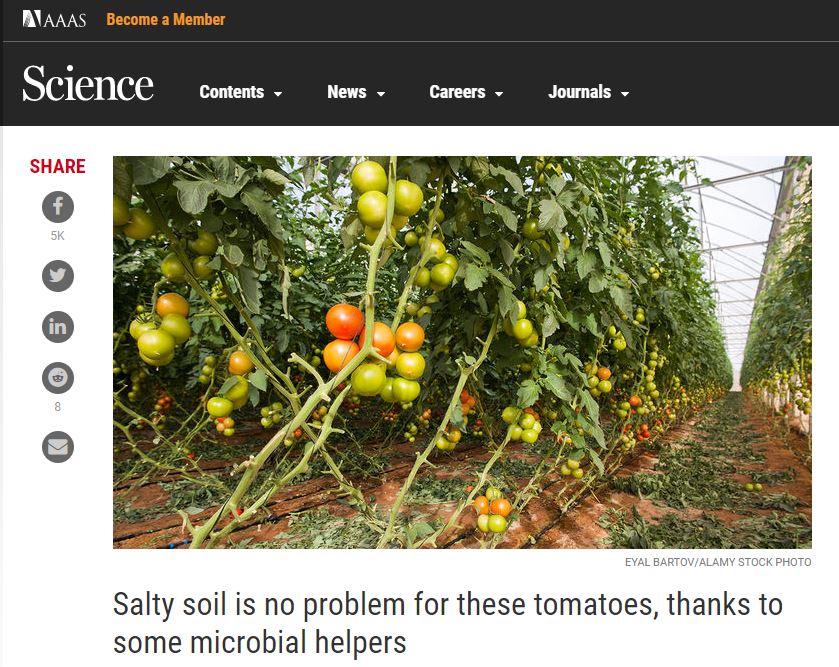
Salty soil is no problem for these tomatoes, thanks to some microbial helpers
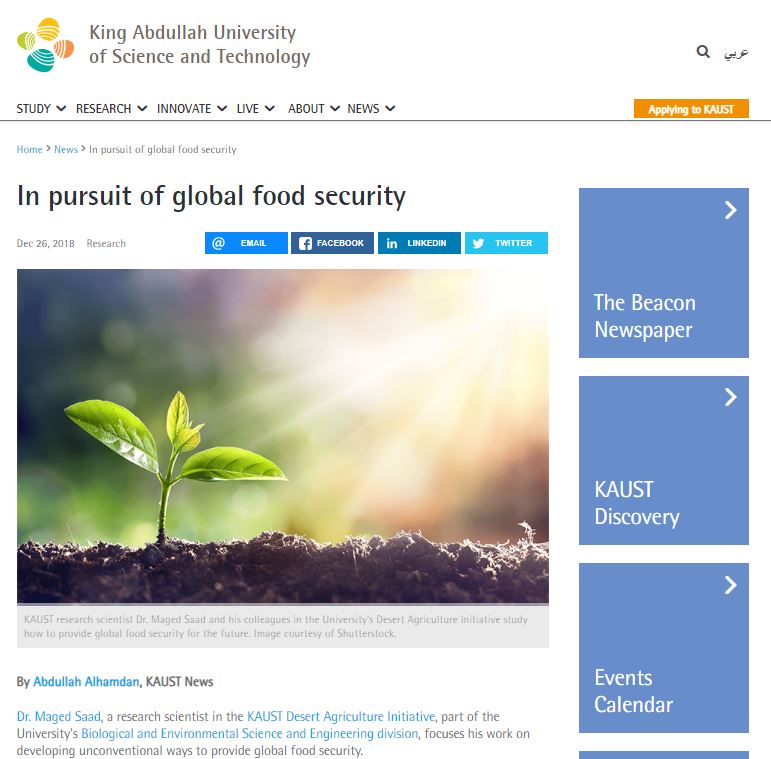
In pursuit of global food security
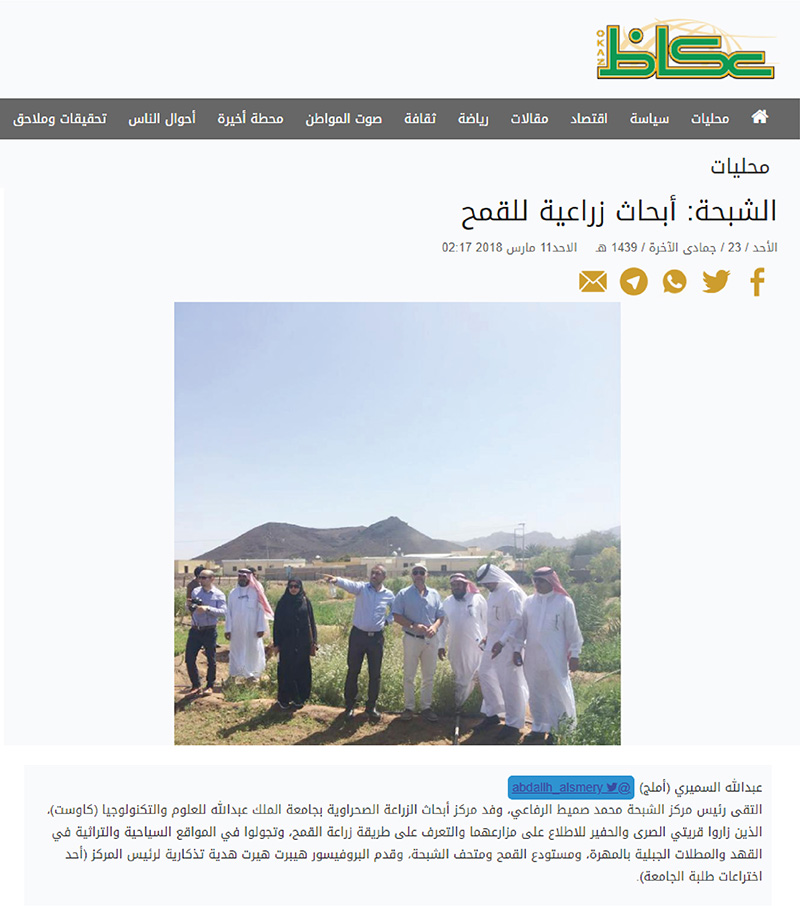
Darwin visiting the city of Shbaha
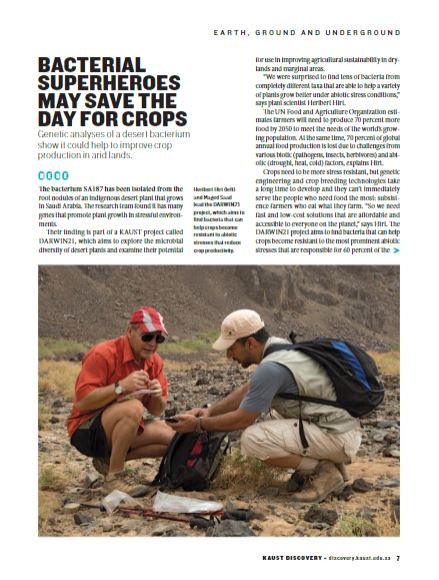
Bacterial Superheros May Save The Day For Crops
KAUST Discovery Issue 6, August 2018 page 7
The Next Green Revolution
To feed the world, food production has to be increased by about 50 percent until the year 2050. Although European and American countries can reach these aims by technological advances, many countries in dry and hot zones already chronically lack the production of enough food for their own populations and depend on imports and foreign aid. Considering that harvest losses by drought, salt and heat stresses amount to approximately 60 percent of total productivity, improvement of abiotic stress tolerance is the main aim in crop improvement in the world. Since plants have colonized land, they have evolved mechanisms to respond to changing environmental conditions and settle in extreme habitats.
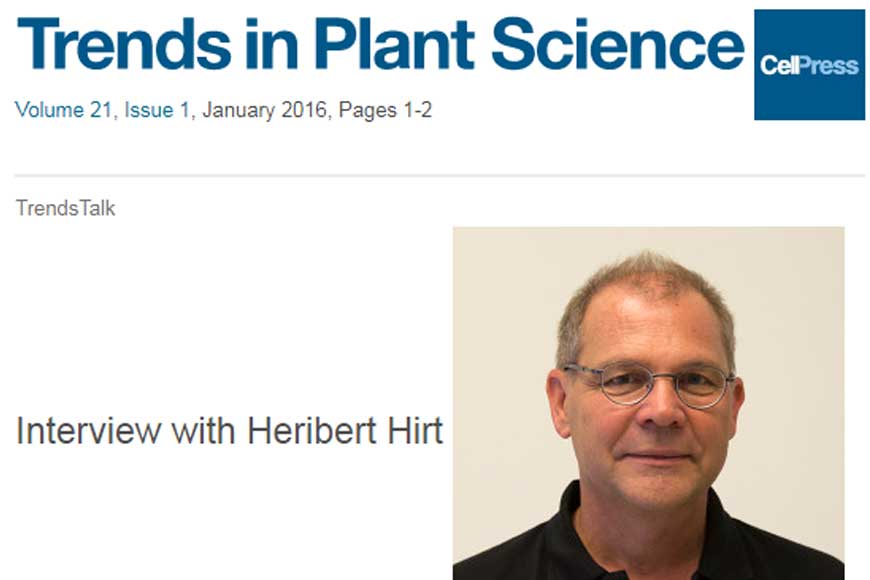
Trends in Plant Science: Interview with Heribert Hirt
As a son of an engineer who traveled widely during his career, Heribert Hirt began his life in the exotic country of Iran, before receiving his high-school education in Germany and then studying biochemistry at the University of Cape Town and then later at the University of Vienna, from where he received his PhD in 1987. He then worked as a postdoctoral fellow in Vienna, Oxford, and Wageningen, before starting his own group at the University of Vienna in 1993. It was also in Vienna that he became professor of genetics in 1997, followed by vice-director of the Gregor Mendel Institute of Plant Molecular Biology, and later head of the Plant Molecular Biology Department of the University of Vienna. In 2007, he decided that it was time for new challenges and accepted an appointment in France to direct the Paris-based INRA-CNRS Plant Genomics Institute for the following 7 years. In 2014, Heribert embarked on yet another challenge by accepting the role to head up the Center for Desert Agriculture at King Abdullah University of Sciences and Technology (KAUST) in Saudi Arabia.
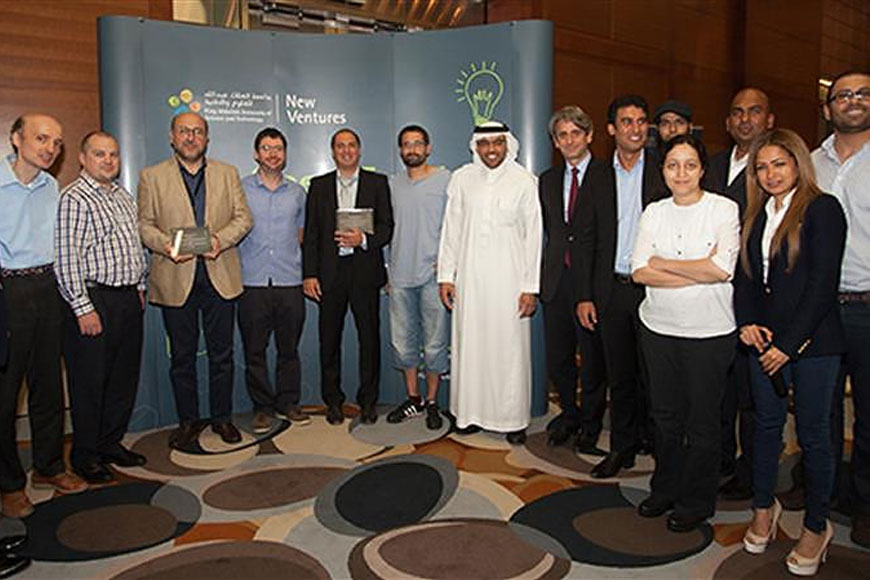
Seed Fund Spring Gala 2014 unveils three winning startup projects
Seed Fund spring 2014 winners pose with members of the Seed Fund team during the Spring Gala 2014.
The winning teams’ project titles and members were: “ZAD – Microbes to improve agriculture under drought, heat and salinity” (Prof. Heribert Hirt, Biological Sciences and Engineering Division (BESE); Prof. Daniele Daffonchio, BESE; Dr. Axel de Zelicourt, postdoctoral fellow, Center for Desert Agriculture (CDA); Dr. Feras F. Lafi, Research Scientist, CDA; Dr. Ramona Marasco, postdoctoral fellow, Red Sea Research Center)…
Global Plants Day Debuts in Saudi Arabia
Today, Saudi Arabia becomes the first country in the GCC to observe Fascination of Plants Day (FOPD), due to the efforts of the KAUST Center for Desert Agriculture. This global event is an effort led by the European Plant Science Organization (EPSO) to raise awareness about plants and plant science. In its third year, over 50 countries will observe FOPD, 26 of which are outside of continental Europe. “The importance of plants for providing food and feed is essential to every country in the world. However, a particularity of the Middle East is its extreme arid and hot climate conditions, which are major limiting factors for agricultural production,” said Heribert Hirt, professor of bioscience and director of KAUST’s Center for Desert Agriculture (CDA). Hirt is the former president of the EPSO, which gives him a unique perspective on bringing FOPD to the Middle East. “The EPSO started Fascination of Plants Day to raise awareness about the importance of plants in all facets of human life. In fact it’s the first and only world initiative that focuses on the importance of plants for human life,” said Hirt….
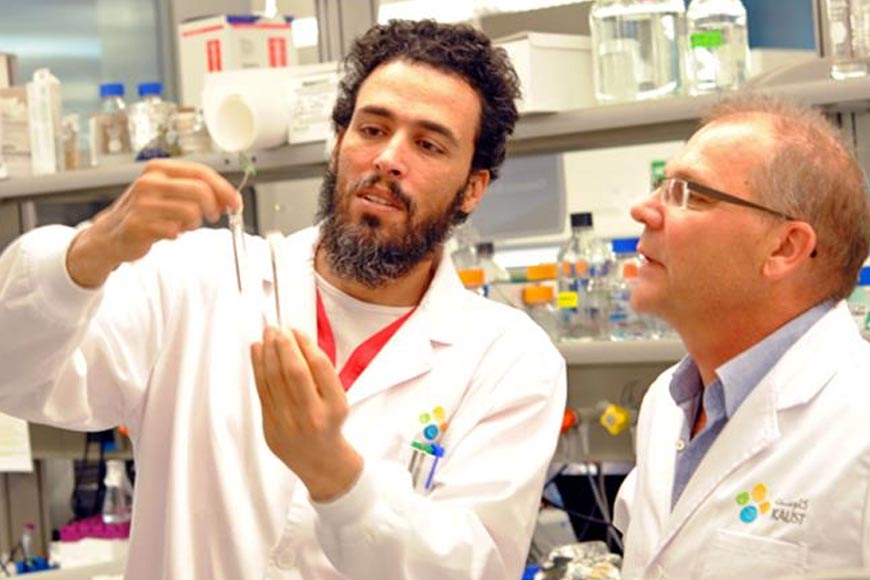
Using science to feed 3 billion people
“The world’s population stands at 6.5 billion people right now. By the year 2050, we will be 9.5 billion. So we will have a gap of about 3 billion people to feed in the next 35 years,” said Prof. Heribert Hirt, Director of KAUST’s Center for Desert Agriculture. An upcoming international conference at KAUST, titled Desert Rhizosphere Microbes for Future Sustainable Agriculture, to be held on November 3-5, 2014, will focus on examining ways to help plants and crops survive and thrive in extreme environmental conditions…..
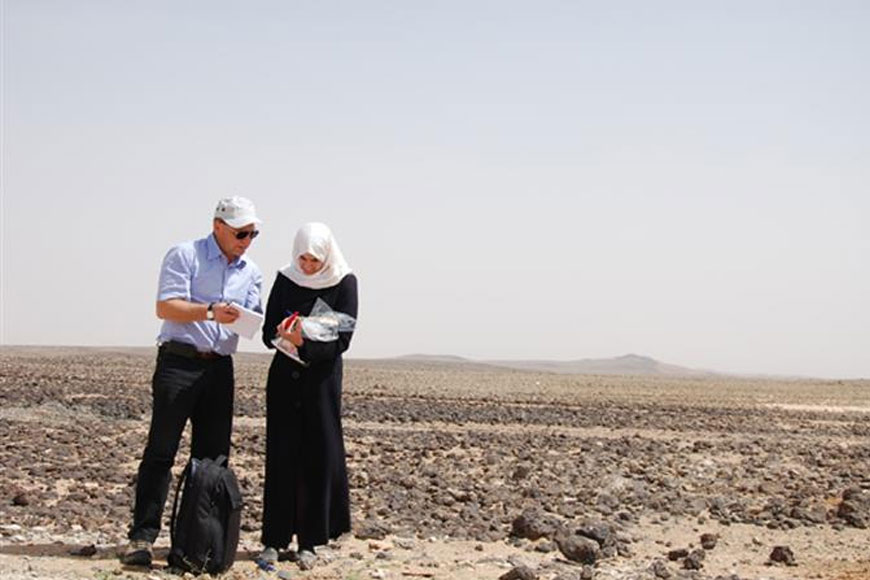
Prof. Hirt takes over as new director of KAUST's Center for Desert Agriculture
Professor Heribert Hirt, formerly Associate Director of the Center for Desert Agriculture, has been appointed Director of the center. Professor Mark Tester has taken over the role of Associate Director with his responsibilities focusing on desert agriculture and translational research…

Darwin21 Founder Prof. Hirt was selected as a Thomson Reuters Highly Cited Researcher
Four KAUST members were recently noted on the highly select “Thomson Reuters Highly Cited Researchers 2014.” Congratulations to Jean M.J. Frechet (Chemistry), Victor M. Calo (Computer Science), Mohamed Eddaoudi (Chemistry), and Heribert Hirt (Plant & Animal Science). Highly Cited Researchers 2014 represents some of world’s leading scientific minds. Over three thousand researchers earned the distinction by writing the greatest numbers of reports officially designated by Essential Science Indicators℠ as Highly Cited Papers—ranking among the top 1% most cited for their subject field and year of publication, earning them the mark of exceptional impact….
